Village Hall Opening Ceremony
The Opening of South Cerney's Village Hall
Report from the Wilts and Glos Standard, Saturday 6th June 1925
A Picturesque and Commodious Building Opening by the Countess of Suffolk
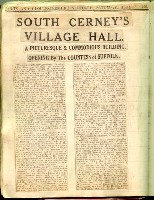
Whatever doubts may have beset the minds of the villagers at that time - and admittedly there was a sharp division of opinion - the inhabitants of South Cerney have full reason to congratulate themselves today on the wisdom of the step they took 3 years ago. It was on May 16th 1922 that a meeting of the parishioners was called to consider an offer made by Captain E.T. Cripps, who, having acquired an old thatched barn in School Lane, placed the site and the building at the disposal of the village for conversion to a village hall.
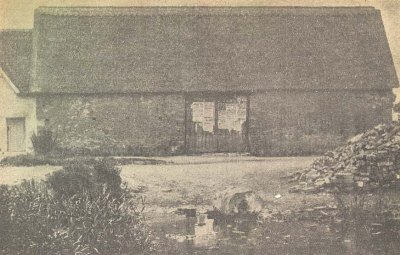
W.&G.S.
The need for a building which could adequately accommodate the many social gatherings now incident to the life of the village had long been felt but, as our illustration - reproduced from a photograph by Mrs.Whittaker-Cantrell - shows, some imagination was needed to conceive of this derelict looking erection as capable of affording what the villagers had in mind, and they may be justly pardoned if they did not immediately jump at what they freely admitted to be a generous offer. Here, however, were 4 solid walls and a wonderful thatched roof, which an estimate showed could be converted into a hall worthy of the village for the moderate sum of £660, and the committee then and there appointed to consider this and any alternative proposals were soon convinced that in the offer of Captain Cripps they had a thing much too good to be missed.
The Committee then set themselves to raise the greater proportion of the money needed, a task rendered considerably less difficult by the public-spirited action of Mr. Reginald A. Berkeley who kindly undertook, as his personal contribution to the funds, to do the whole of the necessary building work without deriving any profit whatever from the transaction. The extent of this generous offer may be seen in the fact that the total cost of the hall was in the end reduced to the modest figure of £564. Two thirds of the required sum being obtained as the result of a series of garden fetes and other entertainments, the work of reconstruction was commenced some months ago and recently completed.
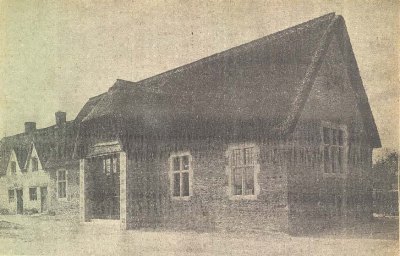
W.&G.S.
Our second illustration gives some idea of the extent of the transformation accomplished externally. The whole of the masonry has been re-faced and with the addition of a handsome entrance porch, and several stone mullioned and leaded windows, there has resulted a building of most pleasing appearance and thoroughly in keeping with its surrounding.
The internal transformation is equally complete. The walls have been plastered and the lower portions boarded to a height of between 3 and 4 feet, the upper portions being tinted with buff distemper in pleasing contrast to the dark oak stain below. The original oak principals supporting the roof have been left in tact, and, still to be seen till they disappear into the newly-laid ceiling, form a pleasing feature of the internal decorations.
Around the walls hang many mounted antlers, presented to Captain Cripps for the decoration of the hall by Lieut-Colonel H.C. Elwes, D.S.O. of Colesbourne Park. There are also framed photographs showing the hall before and after conversion and a photograph of the South Cerney football team which won the Cirencester Hospital Cup, presented to the hall by Dr. Howard Marshall of Cirencester, to commemorate the first public function held in the hall.
The windows are hung with dark red curtains which add to the particular cosy effect of the interior.
The hall is about 60 feet in length and for about half of its length is some 17 feet in width. The addition of a recess increases the width of the other half by about 3 yards. At this end is a full sized billiard table, the gift of Mr.H.E.Whittaker-Cantrell, with cues and other accessories for the game. Opening from the recess is an ante room provided by the removal from its original situation in the village of the hut which formed the headquarters of the Girl Guides and in its new position it still used by them. This can also be approached from a separate entrance at the rear of the building, where are also situated the domestic offices, provided by further annexes.
Artificial lighting is at present provided by 4 oil lamps suspended from the ceiling but pipes have been laid under the floor for the use with acetylene gas when footlights are required for a stage entertainment. A scenic drop curtain, formerly in use at Cirencester, is a permanent fixture, and the accompanying wing sets and back sheets have also been presented to the hall by Captain Cripps. Seating accommodation is furnished by a large number of folding chairs provided by the ex-servicemen of the village, who have a strong representation on the committee.
The opening ceremony took place on Friday afternoon last week, the large company, which completely filled the hall included the Countess of Suffolk, Captain E.T.Cripps M.C., Mrs.Cripps, Mr.William Cripps and Miss Cripps, Mrs.E.W.Cripps, Major F.W.B.Cripps D.S.O. and Mrs.Cripps, Mrs.Berkeley-Stephens, Mrs.E.C.Cripps, the Rev.L.Westmacott, vicar of Cirencester, and Mrs.Westmacott, the Rev.E.W.Hughes, rector of Siddington, and Mrs.Hughes, Major L.Batten K.C. and Mrs.Batten, Mrs.A.J.Palmer, Mr. and Mrs.H.E.Whittaker-Cantrell, Mr. and Mrs.C.Dames, Mrs.Smythe, and the Girl Guide and Brownies and school children.
Captain E.T.Cripps said as the 'chief criminal' chairman of the Ccommittee which built that hall out of an old barn, he extended a very hearty welcome to Lady Suffolk, who had so kindly come there that afternoon to open it. [APPLAUSE.] They were quite certain that, if she could come, Lady Suffolk would do so, because she was always out to help everybody she possibly could. [APPLAUSE.]
He would like to take that opportunity to thank also many ladies and gentlemen in the room who had helped them so much in the last 4 years in their various efforts to raise money for that hall. He remembered the first effort they had, when Mrs.Palmer came. He thought it was fine from 3 to 5 o'clock, but it poured for the rest of the evening and they had to give up. But, Mrs.Palmer's efforts were so successful that they made £100 IN TWO HOURS [APPLAUSE.] - and, if it had continued fine probably they would have made £200.
He was very sorry Lady St. Aldwyn could not be present, for she opened another of their successful efforts, and they thanked her for supporting their shows.
Another person whose presence they were all sorry to miss was their Vicar, who was tied by the leg to his house, and, he was afraid, would not be able to be about for another week or two. However, he sent them a very nice letter expressing the very best wishes of himself and his wife and hoped the hall would be a very great blessing to the village and do a great deal to promote welfare and good comradeship in the village.
The only apology he had to make was that they could not at that ceremony provide them with any sort of entertainment. They tried to secure the Cirencester Orpheus Society, who gave them such a charming entertainment at their last fete, but that seemed to be the most unfortunate day of the year, for those members who were not leaving for a Whitsuntide holiday that day were unable to get away from business.
They had not a bazaar or sale of work, but if anyone liked to stay till the evening they could give them a very good entertainment from seven o'clock till the early morning, a whist drive in the ante-room, and dancing in that hall.
He had first of all to hand to Lady Suffolk, and ask her to hand to the Secretary of the hall afterwards, THE TITLE DEEDS of that old barn. There was a great deal of the old structure left. They could see the old principals which carried the roof. The walls were exactly the same except for the addition of windows and doors, and outside was the yard with what a land agent described as a "commodious set of out-buildings", which he supposed, at that moment belonged to himself. When those deeds had been handed to the Secretary, who would be responsible for them until such time as they would be required, the village would know that they had what the lawyers called "a good title" to their property. [APPLAUSE.]
For the benefit of those who did not know he might tell them what they had done.
Four years ago they started on what might have seemed the hopeless job of turning an old derelict barn into a village hall, and he hoped some of them would think they had been more or less successful. [APPLAUSE.] When they started they made TWO VERY PIOUS RESOLUTIONS. The first was that they would never ask for a subscription of any sort, a resolution which he thought they had very religiously carried out. Although they had been given subscriptions by very kind friends prevented from attending their entertainments, they had never yet asked for a donation or subscription. The other resolution was that they would not start building until they had roughly two thirds of the money they required. He thought those were two very sound resolutions, and, although it took them four years, they had broken neither of those resolutions, and they had carried out what they had originally intended to do. They thought they would be entitled to start building when they had two-thirds of the money, because with the hall completed they would have something to bring in revenue and with it would stand a better chance of providing the balance than without it. He hoped that with the hall and the billiard table they would soon "rake in" the rest of the money and be out of debt. [HEAR, HEAR.]
He was going to attempt A VERY DANGEROUS THING: try to thank a few of the people who had done so much for them and he prayed to be forgiven if he left anyone out.
He would like to say first what a debt they owed to their two secretaries. They started with Mr.Slack, who was one of those who did more to get the scheme going than anyone else. [APPLAUSE.] Mr.Slack left the village and they had a jolly good man in his place in Mr.Riggall, who had helped them tremendously.
Then there was their good friend Mr.Luker. [APPLAUSE.] They could not get on without Mr.Luker in that village, for he was the finest collector of money he had every come across in his life and an excellent Treasurer.
How grateful they were to their friend, Mr.Berkeley, who had given them an enormous amount of his time, drawn plans, done the whole of the work, found labour and materials, and had never taken a shilling profit - all for the good of the cause and FOR THE GOOD OF THE VILLAGE [APPLAUSE.] If they had had to go into the open market for a builder to do the work Mr.Berkeley had done and pay the profit Mr.Berkeley had foregone - something between £50 and £100 - they would not have their hall yet. It was a very big subscription to their funds to get a builder to build a hall like that for nothing, and they were very much indebted to Mr.Berkeley for his public spirited action [APPLAUSE.]
Mr.George Cox was the most wonderful person he had ever had anything to do with as far as building was concerned. For six months he worried Mr.Cox every morning between eight and half-past, and he always gave him the impression that it was a pleasure to stop whatever he was doing at the time to answer any question put to him. He did not know anyone who had shown so much good temper as Mr.George Cox.
The architect remarked that the two BEST POINTS ABOUT THE HALL were the old oak timbers and the thatched roof. He himself thought the whole hall very nice, and he was not going to discriminate but he must thank Mr.Collicott, who put the beautiful thatch on the porch for nothing. [APPLAUSE.]
He could not leave out Mr.Whittaker-Cantrell, who gave them that fine billiard table, a most useful income-producing thing. [APPLAUSE.] It was a splendid gift and would help them tremendously, both in amusement and financially.
The heads adorning the walls were collected by one of his oldest friends, the late Mr.Henry Elwes, and given to the hall through himself by another of his oldest friends, Colonel Elwes, and they decorated and set off their hall very well indeed. [APPLAUSE.]
Mr.Moss, who lived in Tokio, took a very great interest in South Cerney. Writing to thank Mr.Moss for a present, he happened to mention that they were building a village hall, which seemed A SLOW JOB. By way of making it a quicker job, Mr.Moss sent them a cheque for £30 and about a year later repeated the dose and they thanked him very much indeed. [APPLAUSE.] When he sent the second £30, Mr.Moss had just lost his house in the Japanese earthquake and with it some water-colours of South Cerney painted by Mr.Ward, whom some of them might have seen painting in the village.
There were many others he ought to thank, including Mr.Hanson, who gave them a beautiful lamp, the ladies of the Committee, and the members of the Women's Institute, who had worked very hard for the hall and raised a lot of money by means of a beautiful quilt which was sent to London. [APPLAUSE.] Captain Cripps's recital of benefactors finished.
The COUNTESS OF SUFFOLK said it gave her great pleasure to come there that afternoon to perform the opening ceremony of their village hall. She congratulated them most heartily on having that charming building and the fact that their own efforts were responsible for such a result must add yet further to their enjoyment in the use of it. She thought it would be the centre for many happy gatherings in the future, and she had great pleasure in declaring the hall open. [APPLAUSE.]
Lady Suffolk then handed to the keeping of Mr.F.S.Riggall, the honorary secretary, the title deeds of the buildings, after which little Master John Riggall handed her Ladyship a bouquet of blue and white iris.
Major L.Batten K.C., in rising to thank Lady Suffolk for opening the hall, professed to have a grievance. He understood when he consented to discharge that task that it would be his pleasant duty to present the bouquet and that he would awake on the morrow to find himself not only famous but picturesque, for he had made arrangements with Mr.Dennis Moss to do ample justice to the occasion. [LAUGHTER.]
He hoped Lady Suffolk would believe him when he told her on their behalf how gratefully they felt her kindness on coming there, for it was an open secret to some of them that the may-fly was up at Brokenborough, and it was no small sacrifice to leave it behind. [LAUGHTER.] He was sure it was a labour of love to come to a building of such a wonderful description as that in which they were gathered
In years to come the PRIDE AND CHIVALRY OF SOUTH CERNEY would be gathered there to drive whist, or whatever the sport might be, and those who did not know better to play snooker with Mr.Cantrell on a table of which he knew the peculiarities of the cushions. [LAUGHTER.]
It must be a pleasure to any lady to open a building of that sort and find she had no financial responsibility for getting it open and no legal liability for seeing it was shut at the proper time; saving for the solitude and majesty in which she had had to sit there, it must be a pleasure unalloyed. [LAUGHTER.]
On behalf of South Cerney - and he identified himself with Cerney on that occasion, because he owed that privilege to the fact that those who lived in South Cerney were too speechless with emotion to discharge the task - he said they must not let Lady Suffolk off with the duties she had just discharged. She must be permanently identified with that building.
First of all he should refuse to call that building by so common-place a title as "village hall" or "institute"! - dreadful word: Let it be known for time immemorial as "CRIPPS'S BARN" [LAUGHTER] and let "Cripps's Barn" fixture in the list of meets of the Vale of White Horse Hunt, having made arrangements with Mr.Tim Cripps for the removal of those tariffs which placed an obstacle in the way of attending meets at their friends' homes, and let Lady Suffolk attend in her prettiest habit.
He thought for the edification of years to come that Lady Suffolk should give them a photograph of herself in order that coming generations of South Cerney might see what manner of Lady was she who opened that "Cripps Barn". [HEAR, HEAR.]
He saw ample space round those walls in which the history of South Cerney could find PICTORIAL RECORD: spaces between the windows in which Gassor could be represented refusing to put up a sluice; where there could be placed a photograph of the historic occasion on which the Cerney War Memorial Committee at last came to a final agreement - that should not be missed; space for a picture of Mr.Cripps when he returned from what future ages would believe were the crusades, against those savage beasts which were common objects on the sewage farm. [LAUGHTER.]
Let them get Captain Cripps to press Lady Suffolk to present them with a framed photograph of herself as he has suggested. Then he would only say of Mr.Fred Cripps and those more fortunate than himself that when tax-gatherers should ask them in the future to do their little best towards the American debt, it would be with pleasure, if with indifferent punctuality, that they would do their duty.
On behalf of South Cerney he had to thank her Ladyship for the charm and distinction and good will with which she had added to the social success of that important gathering. [APPLAUSE.]
Mrs.Smythe, fully conscious of her inability to clothe her words with either the grace or picturesqueness of Major Batten, seconded the vote of thanks, which was passed with acclamation.
Captain Cripps then sought to close the meeting, but Mr.H.Luker interposed to repair an omission. He said Captain Cripps had mentioned nearly everyone who had done anything for the hall but did not say a word of what he had done himself. [HEAR, HEAR.] If it had not been for the generosity, and the business capabilities of Capt Cripps that hall would still be a distant vision. [HEAR, HEAR.] and they had to thank him heartily for the manner in which he had conducted the committee meetings and for his great kindness and for his benevolence to them. [APPLAUSE.] As long as that hall existed Captain Cripps's name would never be forgotten in South Cerney. He called for cheers for Captain Cripps, which were heartily given.
The meeting then closed with the National Anthem.
On her return to South Cerney Manor, Lady Suffolk stopped to talk with Mr.Joseph Painter, one of Cerney's oldest inhabitants and an old retainer of the Suffolk household, with whom she chatted over the wall of his glorious blossoming garden.
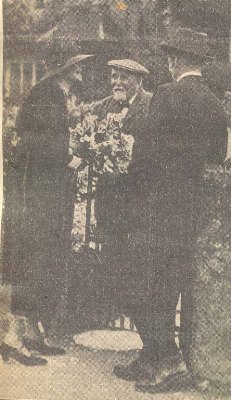
with Mr.Joseph Painter,
an old retainer of the Suffolk family
W.&G.S.
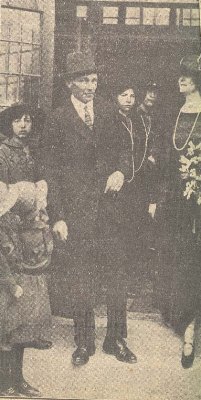
W.&G.S.
About the Countess of Suffolk
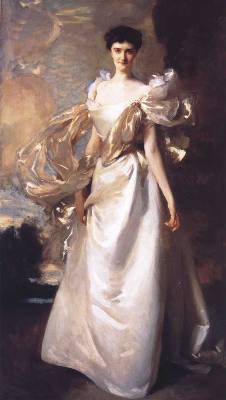
painted by John Singer Sargeant
Margaret Leiter (1880-1968), known as Daisy, the second daughter of American entrepreneur Levi Leiter, became Countess of Suffolk on her marriage to Henry Howard, 19th Earl of Suffolk and 12th Earl of Berkshire (b.1877) in 1904.
The couple met in India in 1903 when Daisy was visiting her sister, Mary, wife of the Viceroy, Lord Curzon, to whom Henry was aide-de-camp. The New York Times reported that the marriage (in other words, Daisy's fortune) would see the Earl's Charlton Park estate near Malmesbury 'restored to the glory of its former days'.
By the time she opened South Cerney Village Hall in 1925 Daisy was already a widow, Henry having been killed in the First World War at the Battle of Istabulat in Iraq in 1917.
She also lost her eldest son, Charles, the 20th Earl (b.1906), in the Second World War. Charles, a scientist and bomb disposal expert, died in 1941 while working on his 35th disposal operation, the victim of a booby trap fuse.
He was posthumously awarded the George Cross 'for conspicuous bravery in connection with bomb disposal'.
Further Images of the Village Hall
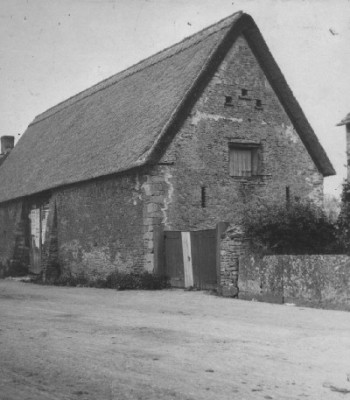
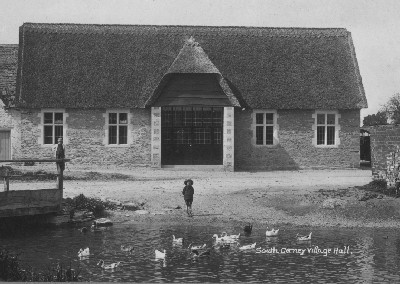
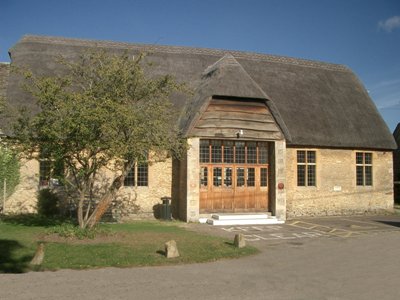
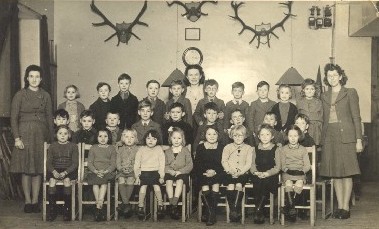
Note the 'heads adorning the walls' were still in place.
